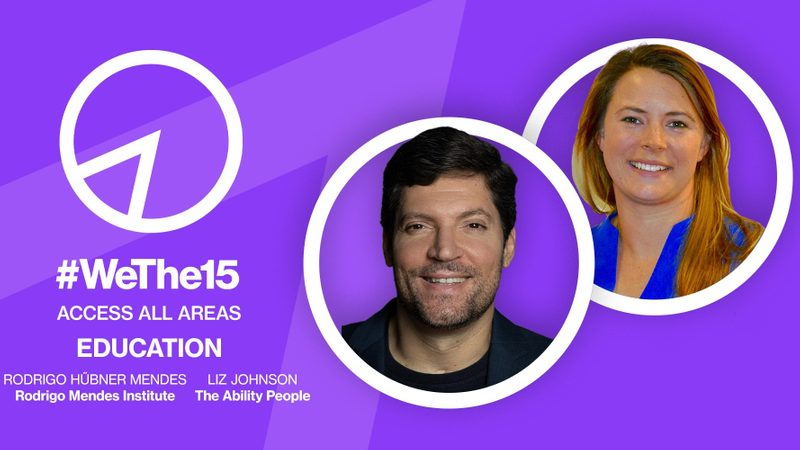
Ⓒ WeThe15, A purple graphic with white border and WeThe15 logo. It shows pictures of a man and a women inside circles. It reads '#WeThe15 Access All Areas, Education, Rodrigo Hubner Mendes, Rodrigo Mendes Institute; and Liz Johnson, The Ability People.
- The seventh episode of the WeThe15: Access All Areas podcast explores the theme of education and what barriers exists that prevent access to it
In the seventh episode of the WeThe15: Access All Areas podcast, broadcaster and host Andy Stevenson is joined by British Paralympic swimmer turned entrepreneur Liz Johnson and Rodrigo Hubner Mendes, founder and CEO of the Rodrigo Mendes Institute, to discuss the importance of making education accessible and inclusive.
During the podcast Mendes, who is paraplegic as a result of a car-jacking incident when he was 18, recounts why he changed career paths from medicine to becoming a champion for accessible education in Brazil.
Commenting on the transition of special schools to inclusive schools, Mendes noted: “What to do when a parent, when a father, a mother, asks, ‘but look, my child needs protection, my child needs specialists, my child needs an environment that makes me confident that she will be well served’.
“Well, it's a process of changing the mindset of the school. We observed that somehow the teachers that work in these institutions … believe that those children will not reach autonomy. And they told the parents, they said openly, look, don't insist because they have syndromes. They cannot conquer autonomy. It's like defining where they will go ... before they started their lives. So it failed, did not work and inclusive schools came as another proposal trying to really stimulate, [and] challenge.
“What I see is that a special school classroom does not challenge the child. And that is fundamental in terms of human development.”
Johnson, who has cerebral palsy and is the founder of The Ability People, the UK's first disability employment agency,discussed her experience of the education system in the UK, and the role her mother, a primary school teacher, played in ensuring she had an equitable experience: “I realise how much effort my mum put in… It's often a post-code-lottery in terms of the teachers you encounter and the experience and the attitudes that they have. And I guess the people that are in your classroom too, it all adds up.”
She added: “In the teacher training programme [in the UK] there is a very small piece, and element, a module, in the grand scheme of things on teaching people [with] disabilities. Inclusion should be embedded across an entire programme because otherwise people sort of compartmentalise it … and box it in that one thing.
“To be truly inclusive, it needs to be across everything all the time, all the content. Because ultimately, it's just the principles of human interaction.”
Mendes and Johnson also highlighted that access to quality education is key to seeing greater representation of persons with disabilities in society. They also reiterated that physical education is often overlooked but can play an important role in making education accessible and inclusive.
For more details and the full episode, subscribe and listen to the series here.